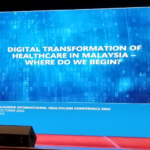Digital Health Malaysia (DHM), a special interest group (SIG) comprised of doctors turned entrepreneurs was reported as saying, “Digitalisation is inevitable. Patients will constantly look for options (to be delivered) on their devices. That means some non-qualified person can start selling their services.”
This is potentially, very risky. We will explain why later in this article.
Quantum
Back to the digital landscape.
Such was the scenario before the coronavirus outbreak and it was pretty similar to the Wild, Wild West where anything and everything you can think of, is likely being offered online.
And anyone with a device and an Internet connection, is going to stumble across medical solutions, cures, medical devices, healthcare information. Therein lies the potential danger, not only to patient safety, but also to service providers.
This is one of the many topics that was brought up last year during the roundtable, where MOH’s Senior Deputy Director, Dr. Fazilah Shaik Allaudin attended as guest-of-honour.

Fast forward to today, and we are currently in a pandemic that has accelerated digitalisation in many ways.
In light of this, EITN sought out Dr. Fazilah to catch up on the topics discussed last year.
She pointed out, “The entire pandemic has taught us a lot of things. It has accelerated the entire digital health vision we have, in the space of just three months.”
Acceleration
For average folks, and even the non- digital savvy, virtual meetings have become comfortable and seamless with our daily activities.
In the area of healthcare, patients who preferred to walk into a healthcare institution to receive consultation and treatment, are now comfortable with existing services like virtual clinics and virtual health advisories.
Many may notice that now, because of fear and anxiety and social distancing, people are very comfortable about picking up a phone and asking a doctor for consultation.
Sure enough, the take up of existing services like virtual clinics and virtual health advisories have accelerated, and Dr. Fazilah admits there are processes that can be smoothened out.
Regulating the quantum
An initiative to regulate private online healthcare services, began in 2017 due to the need to recognise what is valid and what is not, out there on the Internet.
Dr. Fazilah noted, “It’s actually more of a bottoms-up initiative, with service providers coming to MOH wanting to be recognised.
“At the same time we had private insurance companies calling us for clarity on how to reimburse patients who receive online healthcare services.
“That was the question, and that was how this whole thing began.”
Sure enough, a consultancy has begun for development of a regulatory framework, and it will be guided by the 5 principles of patient safety, quality, confidentiality, accountability and traceability. This consultancy will conclude by end of 2020.
Coming together
During this pandemic, Dr. Fazilah sees the public and private sector collaborating at a rate and quantum, like never before. And technology makes this possible.
There are virtual health advisories by an expert panel of doctors who do it as a service to the public, there are live webinars to disseminate health education, a contact tracing app was an inter-agency and inter-ministry collaboration, and even virtual clinics are being organised.
“For example, with virtual clinics, we have all the existing heathcare platforms coming onboard to offer services, some on a CSR basis,” Dr. Fazilah said. She cautions at the same time that we have to remember this urgency, and find a way to maintain this momentum for a resilient nation and a thriving digital healthcare community.








